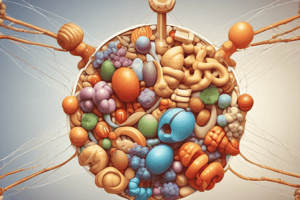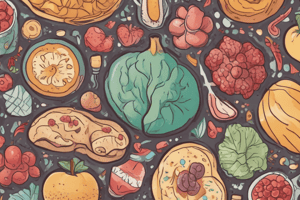Podcast
Questions and Answers
What are the three forms of carbohydrates?
What are the three forms of carbohydrates?
- Monosaccharide, Disaccharide, Polysaccharide (correct)
- Monosaccharide, Disaccharide, Protein
- Starch, Glycogen, Fiber
- Carbohydrate, Fiber, Glucose
What is the storage form of glucose found in plants?
What is the storage form of glucose found in plants?
- Glucose
- Fiber
- Glycogen
- Starch (correct)
Which of the following is a characteristic of complex carbohydrates?
Which of the following is a characteristic of complex carbohydrates?
- High in fat
- May provide fiber in addition to glucose (correct)
- Found only in animal products
- Low in vitamins and minerals
What happens to glucose not used by the cells?
What happens to glucose not used by the cells?
What is the main reason for using carbohydrates?
What is the main reason for using carbohydrates?
Which of the following is a source of simple carbohydrates?
Which of the following is a source of simple carbohydrates?
What is the importance of nutritional fibers?
What is the importance of nutritional fibers?
How do starchy foods replace muscle glycogen?
How do starchy foods replace muscle glycogen?
What is the approximate limit of glycogen capacity in the human body?
What is the approximate limit of glycogen capacity in the human body?
How long do glycogen stores last when at rest?
How long do glycogen stores last when at rest?
Why is eating 5-6 meals or snacks a day recommended?
Why is eating 5-6 meals or snacks a day recommended?
What percentage of the total calories in the American diet are carbohydrates?
What percentage of the total calories in the American diet are carbohydrates?
Why are carbohydrates widely available in most parts of the world?
Why are carbohydrates widely available in most parts of the world?
Why is the brain an obligate glucose user?
Why is the brain an obligate glucose user?
What is the recommended daily intake of carbohydrates as a percentage of total calories?
What is the recommended daily intake of carbohydrates as a percentage of total calories?
What is the recommended daily intake of complex carbohydrates in grams?
What is the recommended daily intake of complex carbohydrates in grams?
Flashcards are hidden until you start studying
Study Notes
Carbohydrates
- Carbohydrates are organic compounds of carbon, hydrogen, and oxygen, found in simple or complex forms.
- Simple carbohydrates (monosaccharides and disaccharides) are valuable sources of energy.
- Complex carbohydrates (polysaccharides) are also valuable sources of energy and provide fiber.
- Starch is the storage form of glucose in plants, while glycogen is the storage form in the liver and muscle.
Types of Carbohydrates
- Simple sugars are found in confectionery, muesli bars, cakes, biscuits, cereals, puddings, soft drinks, juices, and jam and honey, but they also contain fat.
- Starchy carbohydrates are found in potatoes, rice, bread, whole grain cereals, semi-skimmed milk, yoghurt, fruit, vegetables, beans, and pulses, and are low in fat and rich in vitamins, minerals, and protein.
Importance of Carbohydrates
- Carbohydrates are the main source of energy in the diet, providing approximately 50% of total calories in the American diet and up to 80% in many developing countries.
- The brain requires an estimated 100 grams of glucose per day, which is one-third to one-half of the carbohydrates present in the average diet.
- Carbohydrates fuel the body, and it is recommended to consume at least 55% of total caloric intake (about 300-375 grams a day) as primarily complex carbohydrates.
Benefits of Carbohydrates
- Increased levels of complex carbohydrates appear to reduce risk factors of chronic diet-related disorders such as heart disease, diabetes, and some cancers.
- Eating 5-6 meals or snacks a day can help maximize glycogen stores and energy levels, minimize fat storage, and stabilize blood glucose and insulin levels.
- Breakfast is essential to replenish glycogen stores, which can last for approximately 10-12 hours when at rest.
Studying That Suits You
Use AI to generate personalized quizzes and flashcards to suit your learning preferences.




